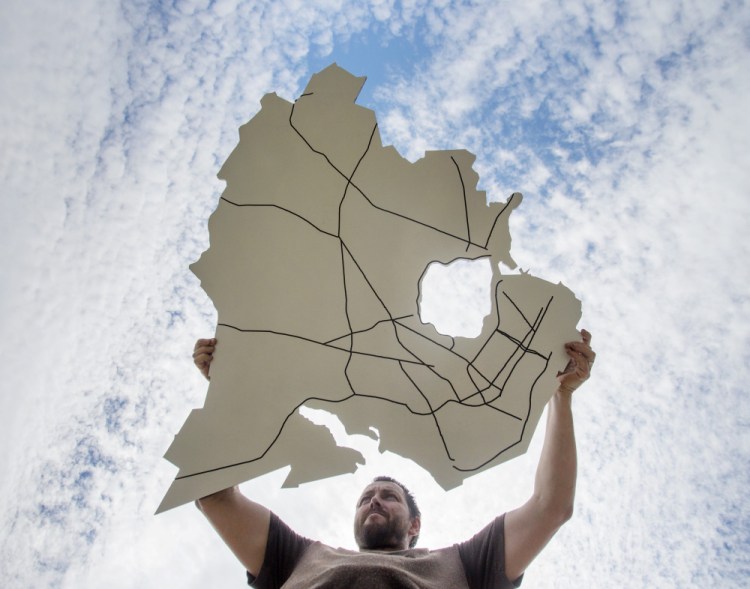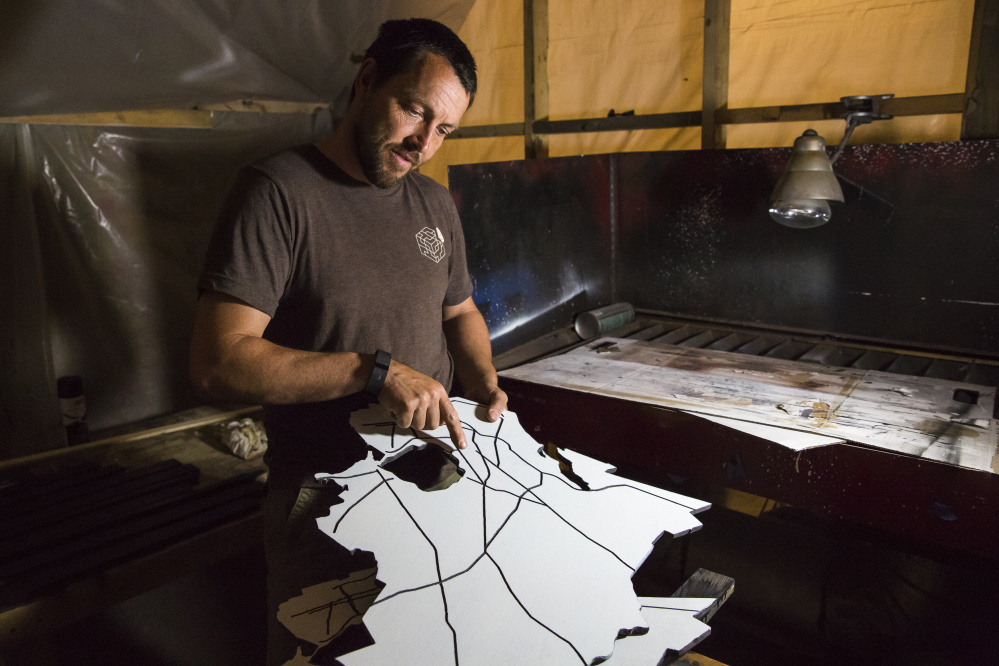Officials in Portland are hoping that a piece of interactive art will bring people to the table so they can share their ideas for the city’s future.
In this case, it’s literally a table – one in the shape of the city that nearly 67,000 people call home and where tens of thousands of others work and visit.
The owner of a community workshop for do-it-yourselfers is creating a Portland-shaped tabletop that includes the city’s jagged coastline, Back Cove and major traffic roads, along with scale models of buildings of varying heights and uses. People will be invited to play around with the buildings and the table to build their ideal city.
The goal is to engage the community in the city’s master planning effort, which aims to set a direction and vision for development in Portland for the next five to 10 years.
“It’s basically allowing people to come in and play urban planner,” said Jake Ryan, owner of the Open Bench Project, an industrial workshop on Thompson’s Point where members build and create their own projects. “Getting people to express their ideas is awesome. It’s the beginning of civic engagement. It allows people to understand their part of this big experiment of ‘Urban.’ ”
For more than a year, the city has been updating its Comprehensive Plan, a state-certified document that guides policymakers through land-use decisions. These plans are essentially a broad vision statement for a community and can be a litmus test for land use and zoning policies. Opponents of a project can challenge any development proposal if it doesn’t comply with the master plan.
The last plan was completed in 2003 and updated in 2005. Its certification expired in 2015. When the 2005 plan was drafted, it was done at a time when Portland’s population was stagnant, compared with the rest of Cumberland County. Families who left the city were being replaced by single people.
Now, Portland is one of the few communities in the state with a growing population. That growth is largely fueled by immigrants, whether they are refugees or people seeking asylum.
GROWTH CREATES SOME DISCOMFORT
The review comes at a time when Portland is experiencing a surge in development that is making many longtime residents uncomfortable. As multistory hotels, luxury condominiums and apartment complexes rise on the peninsula – and as older housing units get upgraded, leading to increased rents – some have expressed concern that Portland may be losing its small-city feel.
That dynamic has led to vigorous public debates, and in extreme cases, lawsuits over new developments. Conflicts especially arise when the City Council approves zoning changes that introduce new uses or taller buildings into an area.
Jeff Levine, Portland’s planning and urban development director, said he hopes residents will provide feedback about where the city should take a more conservative approach to development so it can preserve the current way of life, and where it should embrace its movement toward a more urban environment.
“The level of development occurring in the city is an opportunity and a challenge,” Levine said. “We’ve heard a lot of different views on it.”
Levine also expects that the plan will address social issues, such as public health and aging.
The city has been trying different things to gather community feedback.
In addition to traditional public forums, it has flashed messages on the iconic Time & Temperature Building to raise awareness about the planning effort. An online survey garnered feedback from more than 2,000 people who either live or work in Maine’s largest city.
Initial feedback from the community shows concern about the affordability of living in the city, as well as a commitment to protecting the working waterfront and addressing sea-level rise, according to the city’s website. Also, more than 75 percent of survey respondents said they supported more residential development along major transportation corridors.
It has been common practice for the city to incorporate studies and neighborhood plans into its Comprehensive Plan. The current plan has 32 attachments, and it’s not uncommon for those plans to contradict one another.
Levine said the new plan will be simpler and more streamlined. Although neighborhood plans and studies will still guide policymakers, they will no longer be incorporated into the Comprehensive Plan, he said.
‘GOOD CONVERSATION PIECE’
The concept of using a table in the shape of the city to assist with long-term planning efforts is one currently being used by Cambridge, Massachusetts.
Its table, which measures 4 feet by 8 feet, has three components: a 3D model with all of the city’s buildings; a color-coded map of the city that shows zoning districts, streets and building footprints; and bright-orange stools that are cut into the shape of the city’s neighborhoods and can fit together like a puzzle.
Cambridge’s table cost that city $20,000, Levine said. A Cambridge official would not discuss the cost, but said the table has been the most successful piece of the city’s effort to engage citizens. Overall, the city’s three-year planning effort costs a total of $3.3 million.
Portland’s table will be decidedly more humble. Ryan is volunteering his time to make the 30-by-30-inch table, as well as several smaller Portland-shaped boards that he calls “clipboard sketch pads.” Levine estimated the city would spend less than $1,000 to cover the materials, which includes plastic, paint and dry-erase coating so people can sketch and make notes.
Major traffic arterials, including Congress, Commercial and Franklin streets, as well as Brighton, Forest and Washington avenues, will be engraved on the table.
Officials plan to have 3D replicas of well-known buildings, such as City Hall, so people can compare hypothetical building heights to something they are already familiar with. Additional 3D models of varying heights and footprints will be created for different types of uses, whether industrial, residential or office.
The city plans to take the table to public events and festivals. Levine said the table will have a regular presence throughout the summer at the Portland Farmers’ Market in Deering Oaks. The table’s first appearance will likely be on July 23, he said.
“It’s just a good conversation piece for any planning discussion,” Levine said.
The table idea has already inspired some creative ideas, Ryan said. He has begun making coffee tables in the shape of islands off the Maine coast that he plans to sell.
“It’s inspired a whole product line for me,” he said.
Send questions/comments to the editors.





Success. Please wait for the page to reload. If the page does not reload within 5 seconds, please refresh the page.
Enter your email and password to access comments.
Hi, to comment on stories you must . This profile is in addition to your subscription and website login.
Already have a commenting profile? .
Invalid username/password.
Please check your email to confirm and complete your registration.
Only subscribers are eligible to post comments. Please subscribe or login first for digital access. Here’s why.
Use the form below to reset your password. When you've submitted your account email, we will send an email with a reset code.